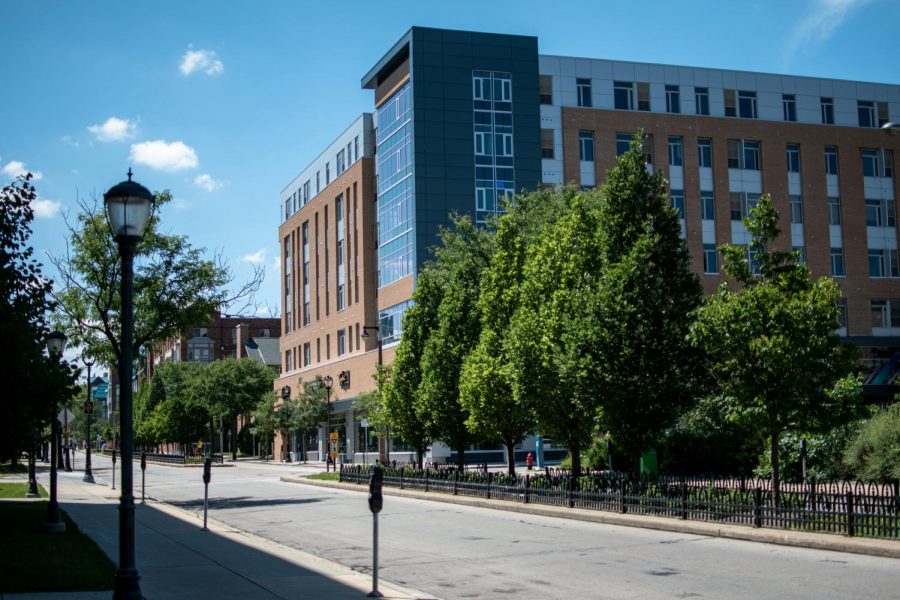Shutdowns in major industries due to the coronavirus pandemic has led to furloughs and layoffs, leaving people financially insecure. Housing insecurity, as well as issues with renting agreements and paying rent are major ways in which this has manifested. According the research done by the Milwaukee Journal Sentinel, eviction filings rose 42% from the levels in 2019 during the first two weeks of June. This data comes following the expiration of the ban on evictions by Governor Tony Evers, which expired on May 27th.
Rachel Tepps, assistant director for Marquette University Apartments, says that all leases were honored in the spring semester, with students who had financial concerns being directed to Marquette Central for additional help. Additionally, Tepps says that students were able to stay in their university-owned apartments during the safer-at-home order that took place in Wisconsin, which was in effect until May 26th, with different counties now in various phases of the reopening plan.
The pandemic has not changed the rates for Marquette-owned apartments because the rates for Spring 2020 were set in the Fall of 2018, with rent rates for this upcoming academic year having been set in Fall of 2019, says Tepps.
Outside of the university, no additional information has been given on how leases may operate if another shutdown were to occur, as the decision is up to the COVID-19 response team and the Finance Office. All of these updates will be given on Marquette’s COVID-19 response website. An announcement by the university on August 3rd has stated that juniors and seniors who choose to go fully online via the university’s new options can be released from their leases at Marquette-owned apartments, but those with leases at the Marq and non-university apartments will need to work with their landlords if they wish to get out of the lease.
Tim Martin is a landlord in the Riverwest area of Milwaukee, who owns and operates four 2-4 tenant units in the Riverwest neighborhood, about a ten minute drive from Marquette’s campus. Including two units that Martin manages for his sister, he oversees a total of 17 units. Martin has worked with two of his tenants who have been experiencing employment setbacks, as well as one tenant who gave a partial payment, to come to solutions regarding their housing.
“For the two units impacted, one has had positive communication and due to that we have been able to be flexible in working with them and they remain there,” says Martin. “They are still a month and one half behind in payments but they stay in close touch and that helps us be able to work with them.”
For the other impacted unit, Martin notes that the communication has not been as clear. Martin initially excused the tenant for five months of rent, but ultimately decided not to continue the lease with them and allowed them to keep their unemployment money to get ahead on their next apartment.
“Allowing the lease to end without renewal was a way that I could avoid an eviction for them and me, as I do not ever want to evict but try to work something out if I can,” says Martin, adding that this individual has since been able to find another place to rent that is more manageable for their budget.
While rent control is not commonplace in Milwaukee, Martin says that he tends to be careful at raising rates when tenants stay on and re-sign annual leases continuously.
“It is more valuable to me, them and the neighborhood when we have a continuity of residence,” Martin says. “Long-term rental tenants who are productive and contributing members of a neighborhood are a bit of a tradition in Riverwest and one I also value.” This continuity is integral to building and maintaining the community of the neighborhood, which Martin says is important to both him and to the Riverwest neighborhood.
Regarding vacancies in his units, Martin says that although he thought it might be difficult to rent during this time, he has found that to not be the case. In his four open units, an advertisement he posted resulted in four to six qualified applications and 10 inquiries for each open spot within a day.
In terms of the future, Martin notes that until a vaccine is developed, it is imperative that federal and state governments assist tenants who are unable to pay their rent. While Wisconsin state did have a ban on evictions from March 27th to May 26th, this order has ended as the pandemic and its repercussions continue to go on.
“In my view, the long-term costs to communities when you do not provide transitional aid especially in a pandemic —impact on schools and the education of children, foreclosures, uptick in domestic violence and possibly crime, further neighborhood disinvestment—far outweigh the short-term costs for providing such transitional assistance,” Martin says.
While uncertain about what exactly the future holds, Martin notes that his tenants will mostly fare okay if lockdown continues due to their sectors of employment. For those who will struggle in this situation, Martin says that they “will try to continue to work with them provided they remain in good communication with us.”
Martin notes that the pandemic has caused him to work on being adaptable and interacting with tenants and technology in new ways.
“Communication with all involved is key–this was true before but has become ever more important,” says Martin.
Going forward, Martin plans to continue utilizing the policies and procedures he developed during shutdown regarding the use of technology, screening and placement in his units and relationships with his tenants.
This story was written by Grace Dawson. She can be reached at grace.dawson@marquette.edu.





